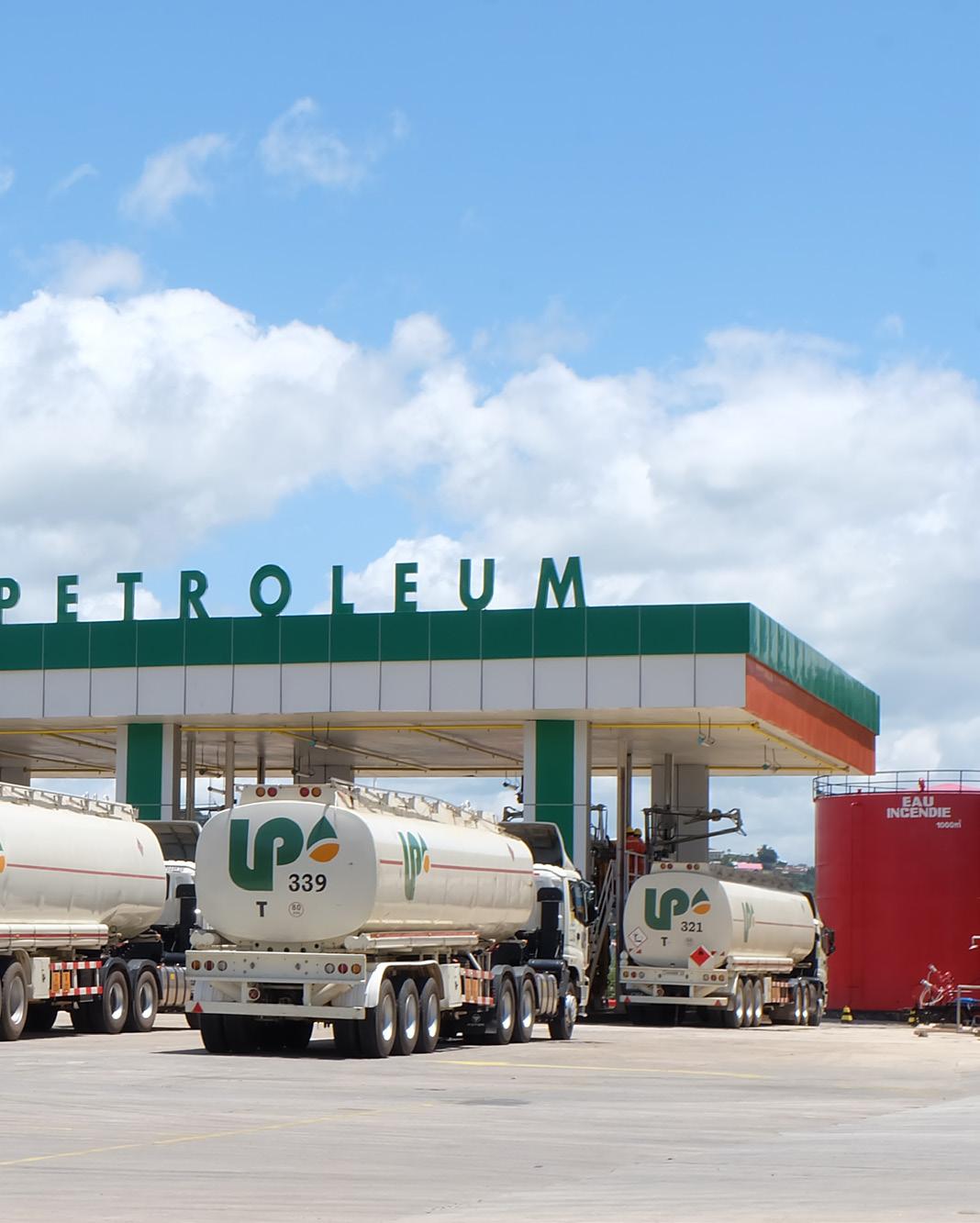
20 minute read
Yara Côte d’Ivoire
Keeping it Green in Côte d’Ivoire
Yara Côte d’Ivoire is working with local farmers to ensure sustainable growth, through high-quality fertiliser and agronomic education
Historically, Côte d’Ivoire has been economically dependent on farming.
Back in 1960, agriculture accounted for 48 percent of the country’s GDP, predominantly thanks to its exports of cocoa. Fast forward to the present day and Côte d’Ivoire has also become one of the world’s biggest exporters of cashew nuts – palm oil, tropical fruits, cotton and rubber are also important agricultural exports.
However, according to World Bank, despite the country’s economic situation improving, since 2012 agriculture has contributed just 14 percent of GDP growth.
There are several reasons why Côte d’Ivoire’s agricultural sector has been constrained. Unpredictable weather patterns caused by climate change and deforestation have led to low crop yields in previous years. Another reason is that agriculture is mainly conducted on a small scale, and smallholders often lack access to products that can increase yields, such as fertilisers.
Kanigui Yeo, General Manager of Yara Côte d’Ivoire, sees opportunities where there are challenges in the agricultural sector
But Kanigui Yeo, General Manager of Yara Côte d’Ivoire, doesn’t just see problems – he also sees potential for growth and change.
“Agriculture is a challenging but exciting space to be working in,” he says. “When you look at all the agri value chain in Côte d’Ivoire you will see problems and opportunities as well. The infrastructure is poor, and more than 95 percent of farmers are smallholders with limited literacy, growing mainly cash crops for the direct export market.
“Most of them don’t apply the basic good agricultural practices and don’t have access to agricultural inputs. They are also excluded from the banking sector. This is a dark picture, but it means there are a lot of opportunities for companies with purpose.”
And Yara Côte d’Ivoire is one such company. It is a division of Yara International with a simple, but hugely important vision: to help feed the world, while protecting the planet.
Yara International itself is a company founded in 1905 with the aim of
solving an emerging famine in Europe, with a unique reputation as the only global crop nutrition company in the industry. It has a worldwide presence of around 16,000 employees and operations in over 60 countries, reporting revenue of $12.9 billion in 2019.
30 YEARS IN CÔTE D’IVOIRE
Yara Côte d’Ivoire launched in 1990, and over the past few decades has been heavily involved in agricultural development in the country.
Its agronomists work with farmers to help them find the correct fertiliser solution for their needs. It offers premium fertilisers, including nitrophosphate compounds, liquid foliar calcium nitrates and micronutrients. It also works closely alongside research bodies to develop many of country’s current fertilisation protocols.
Based in the industrial area of Vridi in Abidjan, Yara Côte d’Ivoire employs around 50 staff, and has a network of more than 50 key distributors.
Since the 1990s, Yara Côte d’Ivoire has been collaborating with the CNRA (Centre National de Recherches Agronomiques), a government research unit which has added further credibility to its research and development. The CNRA has approved many of Yara’s fertilisation protocols for key crops, such as its NPK blend and Nitrabor for cocoa.
“When you add this collaboration to the huge agronomic knowledge of Yara globally, it makes us the place to go for specialities or best products in the market,” Yeo explains. “Strong global and local R&D, key partnerships and non-negotiable quality standards are the major enablers of our longterm collaboration with CNRA.”
Since his appointment as General Manager, Yeo has been focussing on improving team morale and rebuilding the company’s profitability. He also has the challenging task of having to balance capacity with local demand for Yara Côte d’Ivoire’s products.
“There is a critical need to increase capacity to match the level of the demand in recent years,” he says. “In 2018, Yara decided to downsize the activities in Côte d’Ivoire to focus on a smaller but more profitable business. This decision came with a reduction in the blending and storage capacity.
“But two years later, we are stuck with a high demand and a limited capacity during the first half of the year. It’s not a local decision and we’ve started discussions with the stakeholders – they are speaking with our parent company to make this happen.”
Yara operates with a formidable distribution network
EMT
EMT is a renowned producer of blending, bagging, transporting and coating equipment in the fertiliser industry. Together with Yara’s predecessor Hydra EMT, we have helped shape the European fertiliser blending market.
Nowadays the two companies are closely involved in the development of the African fertiliser industry.
With its high quality, long lasting products EMT has been supplying the African market for more than 25 years. Tailor made systems, suited to each customers’ needs is what has provided the company with its reputation of quality and give EMT the status of preferred Yara supplier.
www.emt.tech
There are other ways in which belonging to a global company is beneficial to Yara Côte d’Ivoire.
For example, it works closely with Yara Switzerland to procure raw materials from the company’s network of global suppliers. Maintaining a good relationship with these suppliers is, according to Yeo, key to the company’s success.
“During the peak season, a shortage on a key raw material can lead to contract loss and penalties in the case of some tenders. It is therefore important for us to have a tight and collaborative relationship with our suppliers in respect with our code of business,” he explains.
Another way in which Yara Côte d’Ivoire can benefit from the wider organisation is through Yara’s position as a leader of digital farming devices.
Although Yeo acknowledges this position contrasts with what happens on the ground in countries like Côte d’Ivoire, several digital initiatives have
High Speed Bagging Line * For big bags - jumbo bags. * Capacity 50 to 70 ton m³ per hour. * 120 kg to 1250 kg bags. * Suitable for granular and powder materials. * Available with dust reducing system.


Weighcont Blender * Capacity of 20 to 200 ton per hour. * Unlimited number of hoppers. * Computer controlled. * Custom built. Shamrock Blender * Capacity of 25 to 70 ton/m³ per hour. * Machine size 4,5-5,4-7-9-11,5-14 ton. * Blending and weighing are separated. * Easy and gentle blending process.
EMT Molenpad 10, 1756 EE ‘t Zand The Nederlands. Tel.+31 (0) 224 591213 email: emt@emt.tech www.emt.tech

Fertilizer Inhibitor Treating Unit * Portable. * Stainless steel. * Computer controlled. * High Capacity - 120 m³ per hour.
LEADERSHIP FOCUS
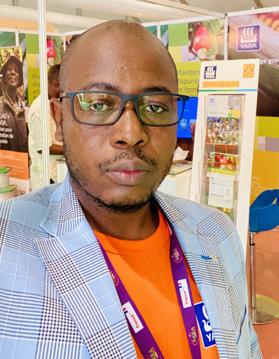
What appealed to you about the role of leading Yara’s Côte d’Ivoire division, and how have you been able to help turn the business around over the past year?
KANIGUI YEO: “Leading Yara Côte d’Ivoire was an exciting challenge and a big risk the leaders of Yara Africa took with me. I had joined the company six months ago when the former Country Manager resigned. I was coming from Unilever and I had a FMCG background with a strong experience in marketing and distribution.
“I joined as the Commercial Manager and my mandate was to reinforce the open market distribution contribution in the business. However, after the resignation of my former boss, they appointed me as General Manager in the middle of many challenges. The business was not profitable and team morale was low, people were resigning, and the blending lines were slow and breaking frequently.
“I had to build a team aligned with the new direction, manage costs effectively, make sure the new line was commissioned and convince the market to trust us despite delays in some deliveries. It was a difficult task and I had to recruit and rely on a few key people who believed we could make it happen. We took tough decisions regarding pricing and costs. In the end, it paid off: The EBIDTA target was achieved at 125 percent and delivered a positive net result for the first time in few years.”

been launched. A Facebook page enables it to share information about products and activities, and to reach out to farmers in remoter areas.
However, most exciting is a recently acquired smart scanner that improves the ease of conducting soil analyses.
“The smart scanner is very effective as it creates trust alongside providing data for the farmers and cooperatives regarding the fertility of their soil, the nutrient deficiency and the recommended needs,” Yeo adds.
GROWING SUSTAINABLY
Gaining the trust of farmers is an important step in Yara’s mission to help improve crop yields in Côte d’Ivoire, as it enables the company
to transfer its 115 years’ worth of agronomic knowledge to them.
“In the communities, we work with lead farmers to train, coach and support to improve their agronomic skills, their practice and grow them to become ambassadors,” Yeo explains. “During this process we provide the fertilisers and the relevant trainings to ensure they increase their yields, income and standards of living.”
In other words, Yara is doing a lot more than simply selling fertiliser. It is also helping educate farmers in sustainable best practice. While it aims to expand its output, it wants to do so in an environmentally friendly manner.
“We are committed to sustainably feeding the populations where we operate, and we ensure that our operations comply with the standards of environment and climate

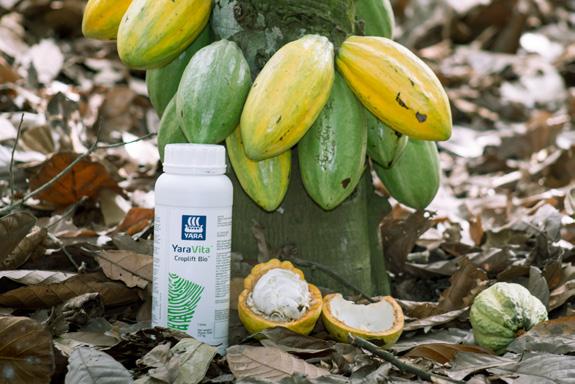
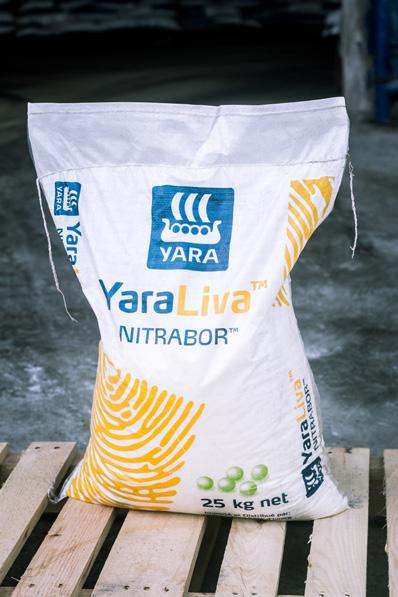
protection,” the General Manager says.
The conversation, perhaps inevitably, moves onto the current COVID-19 crisis.
Yara, like millions of other companies across the world, is working hard to limit the virus’s impact, and it also wants to help mitigate the effects upon local communities.
“During this crisis of COVID-19, we have also been a key player to help the authorities and communities in the country with a donation in kind and in money to buy some personal protective equipment,” Yeo says.
Interestingly, the pandemic has given the General Manager an epiphany.
“At Yara we have the mission to responsibly feed the world and protect the planet,” he says. “At first I didn’t understand the extent to which this was true. But the consequences of the COVID-19 epidemic have made me realise that we have a very important role to play in local food security.”
Yeo quotes the statistics – 50 percent of rice consumed in the country is imported from Asia. Onions and tomatoes are imported from Europe, despite the fact they can be grown in the country. Sub Saharan Africa has the lowest yields per hectare in the world.
“To tackle these wicked problems, we will need to truly collaborate as an industry with the governments, NGOs, the banks with the purpose of building a self-sufficient food production industry in Côte d’Ivoire and in Africa,” he says.
“I believe that we have the human resources, the skills, the lands and the technologies to make it happen.”
With its background in crop nutrition, high quality products and sustainable values, Yara Côte d’Ivoire has every chance of succeeding in its mission.
YARA CÔTE D’IVOIRE
Tel: +225 21 21 55 00 yaraciserviceclient@yara.com www.yara.ci
Powered by More than Coal
South Africa is a country powered by coal. Last year it produced 258.9 million tonnes, around 70 percent of which was used domestically (taking care of 80 percent of the country’s needs), with the rest being exported, activity which accounts for nine percent of the world’s supply.
Not only is Londani Coal ambitiously expanding operations, it is also determined to continue empowering staff and engaging the local community
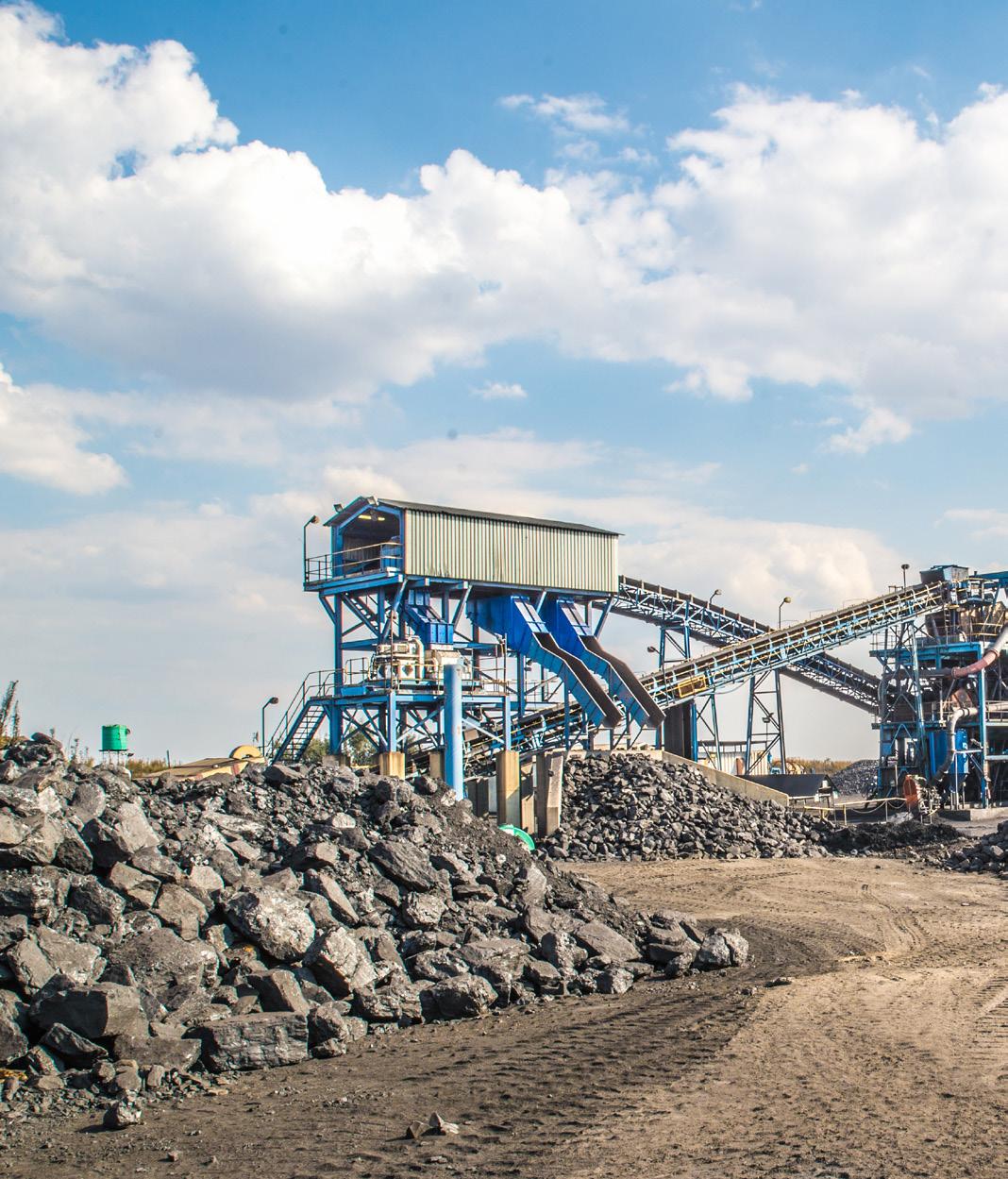
Writer: Dani Redd | Project Manager: Josh Mann
Needless to say, coal mining is a major contributor to the country’s GDP, also providing around 100,000 direct jobs.
But that’s not to say the mining industry is without its challenges. According to Selim Kaymak, Chief Executive Officer of Londani Coal, net investment in the industry has
declined by 15 percent in the past eight years, while major energy producers face their own difficulties – high debt levels and operating costs, capacity constraints and aging equipment.
And then, of course, there’s the ongoing impact of COVID-19.
“The demand for electricity and liquid fuel products is dropping and the producing entities have limited stockpiling space for stock feed or end products,” Kaymak says. “This will in turn impact or disrupt current coal supply streams which will have an adverse effect on a market already under pressure.”
It is hard to imagine how companies can survive, let alone thrive, in such challenging conditions, but Londoni Coal is doing just that.
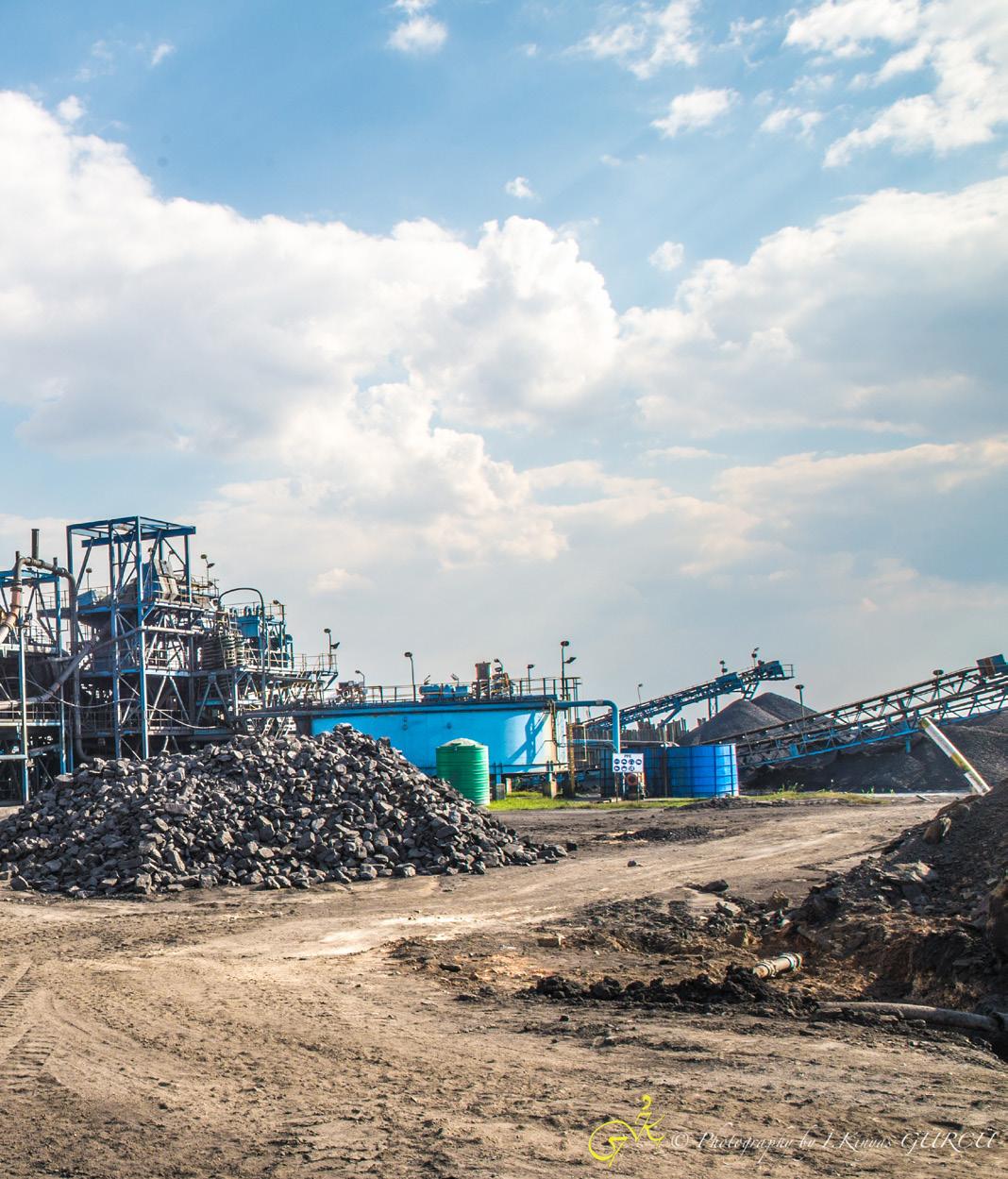
A YOUNG AND DYNAMIC COMPANY
The firm was established in 2006 in the South African province of Mpumalanga. In January 2017 it re-commissioned a processing plant and a mine, Nndanganeni Colliery, which is located in the Witbank/ Middleburg coalfields – production started shortly afterwards.
The complex consists of two open cast mining pits and a DMS processing plant, and produces around 770 kilotonnes of saleable, high quality export product per annum.
Londani employs around 380 full-time employees and contractors who work in the mine, processing plant, material handling and on-site laboratory. It is managed by a dynamic team, overseen by Kaymak, a political science graduate who first became interested in mining when he moved to South Africa to complete a Master’s in Business Administration at the University of Pretoria.
“After completing my MBA, I decided to stay in South Africa,” he adds. “I saw the mining industry as a very attractive, professional endeavour which requires an understanding of the global energy sector. On the other hand, it was also a good space to exercise and implement the knowledge I had gained from several international activities and in interacting with various government entities and NGOs, as well as business industries.
“Through my academic education I was afforded an opportunity to work for several international entities, which enabled me to understand both European and African economies.
How important are partner and supplier relationships to the success of your business?
SELIM KAYMAK: “We treat all contractors and suppliers as partners in our business. An efficient and effective supply chain system with a solid, trusted and reliable relationship with critical suppliers of services is a definite qualifying factor to conduct cost effective, profitable and sustainable business in this environment.
“We value each supplier and stakeholder throughout the value chain and foster longstanding relationships, which is key for current and future operations. As mentioned before, our business model is built on using contractors for the majority of our work and our success proves the aforesaid statement.” Londani Coal allowed me to make practical use of these experiences – the job opportunity was the perfect match.”
INVESTING IN TECHNOLOGY
Since inception of Londani Coal, the CEO has focussed on increasing profitability at the mine by hiring an expert team, and by expanding operations.
During 2018, the company opened up a new box cut within its current mining right, giving it access to highgrade coal that in turn created market opportunities abroad. Then, in 2019, it launched an exploration drilling programme.
“The main purpose is to identify additional resources and to extend our current mining operations within the immediate right,” Kaymak explains. “This will enable us to fully utilise our established complex and maximise returns on invested capital.”
Currently, Londani is actively conducting studies in the surrounding area, hoping to identify new coal reserves.
“We are therefore always open and willing to work with neighbouring mines and reserve owners,” Kaymak continues. “Through this, standing relationships have already been established and value has been

Nafasi Water
With a focus on water reclamation and desalination technology for application in complex industrial and wastewater systems, Nafasi Water began a journey in 2003 to develop, implement and operate world-class industrial desalination projects.
As a 100 percent black-owned South African leading water technology and water utility service company, we partner with industry, government and local communities to provide sustainable solutions to broader water security challenges.
Combining innovative technology with the funding and delivery of world-class water and wastewater treatment projects and services, we aim to sustainably reclaim water affected by industrial and human activities.
www.nafasiwater.com
created. We would like to maintain this momentum and exploit all possible opportunities.”
The CEO is aware that as a junior mining company, it is vital for Londani Coal to form synergies with other mining outfits to survive in a challenging industry environment.
Enabling sustainable mining, while supplying reliable off-grid water supply

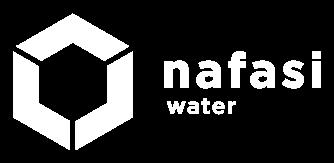
Through effective, proven mine water treatment
www.nafasiwater.com

info@nafasiwater.com
ENVIRONMENTAL | ENGINEERING CONSTRUCTION
The Eco Elementum group of companies provide an array of independent, multidisciplinary and integrated environmental science, engineering and construction services.
+27 12 807 0383 info@ecoe.co.za www.ecoe.co.za Follow us:

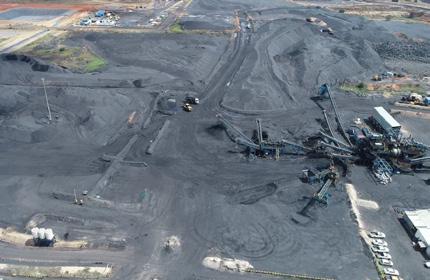


The firm has also been investing in technology to ensure the safety and productivity of its operations, including active vehicle tracking and camera monitoring solutions.
“Investigation of incidents, with the aid of these technologies, has aided a lot in identifying root causes and enabled us to install permanent corrective actions or measures to prevent incidents,” the CEO says.
Technological advances also help with production and measuring, improving efficiency and accuracy. Here, Londani Coal makes use of flyover surveys and partners with leaders in the field for accurate measuring, image-making and 3D modelling.
“This real-time data is used in our costing models, where each aspect of the operation can be quantified and qualified,” Kaymak explains. “We also have full-time geologists with specialised software that assess each step of our current and future mining areas to ensure we gain as much as possible by minimising coal losses.
“Monthly production areas are constantly coupled and measured against initial geological models of the area, and we manage mining gains and losses very accurately.”
HELPING IN THE COMMUNITY
Such attention to detail is fundamental to a mining company’s longevity.
However, for Kaymak, mining isn’t just about profit – it’s also about people. Londani Coal fosters a positive working environment where staff are encouraged to take ownership of their area of responsibility, thereby empowering them to reach their full potential.
“We strive to maintain a participative leadership culture throughout the business where we work together and support each other
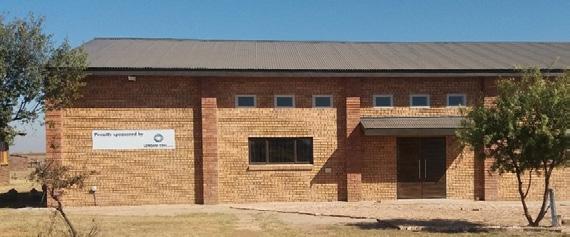
from top to bottom, irrespective of title or position,” he explains.
“Through the years we have mastered the field of dealing with diversity within the work environment. We are a very diverse team with vastly different backgrounds and demographics, but we make it work and use it to the full potential of the business.”
The company’s caring attitude extends beyond its staff to society as a whole. It is committed to ensuring that the community living within its area of operations are engaged and empowered. As well as stimulating the microeconomy by providing jobs, Londani takes an active role in helping local people.
“Our aim is to provide the best opportunities by working hand in hand with local government and non-governmental organisations according to an approved SLP plan,” Kaymak explains. “We believe that each skill
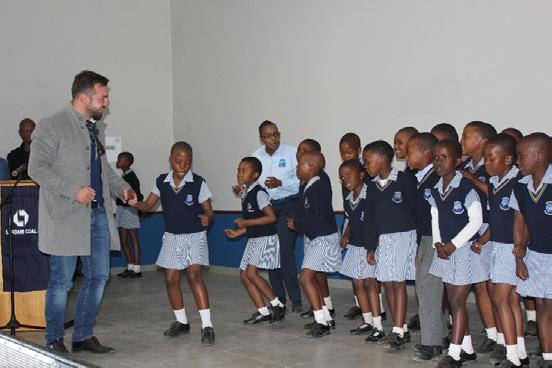
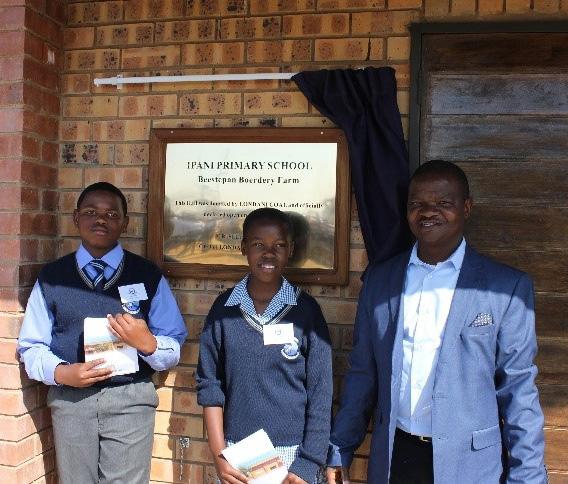
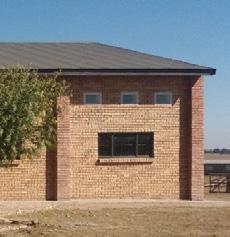
or infrastructure development has a lasting impact on the lives of our local people, which will remain for future generations to come.”
Londani Coal has helped organise events for World Aids Day, Mandela Day and Women’s Day, as well as establishing quarterly health campaigns in the community. It also pursues and conducts skills development as part of ongoing business operations. It trains community members to use mining machines and organises formal apprenticeships to boost employability and empowerment.
Kaymak also proudly reports that Londani Coal built a hall for Ipani Primary School, which is alongside the community and can accommodate up to 400 learners. It also helps with ad hoc projects for the students.

has not dampened Londani Coal’s spirit. As the conversation draws to a close, Kaymak reveals plans to utilise the company’s mining right in full, alongside ambitious plans for expansion.
“As mentioned, we are actively looking for new reserves and partners to extend our current footprint in the mining industry. This is high on our list of priorities over the next 24 months,” he says.
“We will furthermore aim to grow on our existing customer base and want to establish more large-scale offtake agreements, both on the export and local market. Having said this, it will only be achievable by establishing joint ventures or partnerships with industry-leading companies.”
As the company expands, it will also work towards reducing operational costs and increasing profitability, moves which will help it to improve
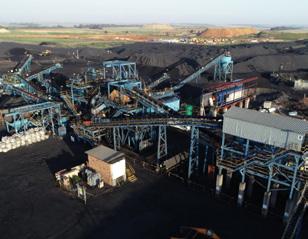
financial returns for its stakeholders. It will do all this while concentrating on maintaining positive relations with suppliers, contractors and the surrounding community, as well as keeping its people motivated.
And it is here that Kaymak ends the conversation by reiterating Londani Coal’s people-first values.
“In closing, we have always and will continue to focus on attracting and retaining the best employees in the market,” he says. “Our employees are the heartbeat of this company.”
LONDANI COAL
Tel: +27 11 684 2764 info@londanicoal.co.za www.londanicoal.co.za
Gold Standard GHANA’S

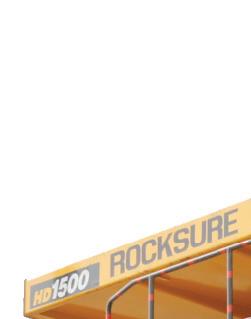
Gold mining has long been a staple economic activity in Ghana.
Historical sources show that gold was mined in West Africa as early as the fifth century, well before European settlers began to monopolise the trade during the colonial era.
And while it is uncertain when exactly gold mining began in Ghana specifically, it continues to be the nation’s most significant domestic revenue generator. In 2017, for instance, total mining fiscal receipts paid to the Ghana Revenue Authority stood at around $370 million, up 31 percent on the previous year.
This illustrious history and relative stability of the current marketplace make Ghanaian mining an attractive proposition for organisations and individuals to pursue opportunities.
For instance, Rocksure International established itself as a provider of mining services in the country just over 10 years ago.
Through execution of a localoriented strategy, the company has built up considerable capacity and flexibility for implementing measures to meet the challenges of planning, equipping and staffing various mining sites, with operations also in Mali.
For Fabian Limberger, Chief Commercial Officer and one of very few expatriates managing the
Rocksure International has been providing the full value chain of mining services for more than a decade, rising from humble beginnings into a 1,000-strong, Ghanaian-led enterprise

Writer: Tom Wadlow | Project Manager: Josh Mann









